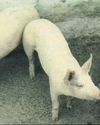By securing planting rights to varieties bred to withstand warmer climates, Rosle Boerdery’s Charles Rossouw has become a leader in blueberry production in South Africa. Lindi Botha reports.

Hailed as a super food, blueberries are in growing demand worldwide, and to meet this need will require a significant boost in supply and innovation.
Blueberries normally require a high number of chilling units. In South Africa, blueberry farming has therefore been limited to colder climates, with 60% of production taking place in the Western Cape. However, in 2006, Charles Rossouw, owner of Rosle Boerdery in the Loskop Valley of Limpopo, saw an opportunity to plant blueberries on a large scale in this warmer climate after investigating low-chill varieties.
TAKING THE LONG VIEW
Rosle Boerdery has 800ha under production, of which 700ha are planted to citrus. The remaining 100ha were under grapes, and it was this land that Rossouw targeted for blueberries after realising that grapes were not the ideal crop for his farm.
“This is a summer rainfall region and it receives around 500mm annually. The last few years, however, have seen less rain and a good exchange rate, so the grapes have made money, but over the long term they’re not very profitable. Also, the cost of labour with grapes is incredibly high as it involves tending the vines, harvesting and packing.
“With blueberries, I have the same spraying programme as with grapes, but I start spending money on labour only once the harvest starts. Also, my exposure to risk is lower because when the rainy season starts I’ve already harvested the bulk of the blueberries.”
As traditional blueberries would not have done well in the higher temperatures of Groblersdal, Rossouw has purchased the rights to grow the ever-green Australian OZblu varieties, which have been specifically bred to forego dormancy and flourish with low chilling requirements.
Diese Geschichte stammt aus der July 6, 2018-Ausgabe von Farmer's Weekly.
Starten Sie Ihre 7-tägige kostenlose Testversion von Magzter GOLD, um auf Tausende kuratierte Premium-Storys sowie über 8.000 Zeitschriften und Zeitungen zuzugreifen.
Bereits Abonnent ? Anmelden
Diese Geschichte stammt aus der July 6, 2018-Ausgabe von Farmer's Weekly.
Starten Sie Ihre 7-tägige kostenlose Testversion von Magzter GOLD, um auf Tausende kuratierte Premium-Storys sowie über 8.000 Zeitschriften und Zeitungen zuzugreifen.
Bereits Abonnent? Anmelden

Improving efficiencies in feed and grain milling
Bühler, a Swiss-based company that provides solutions and equipment for various industries, including food and animal feed processing, has pledged that by 2025, it will deliver scalable solutions that will reduce energy, waste and water by 50% in the value chains of its customers.

Tips for better olive production
At an SA Olive Association field day in November, industry experts shared ways to improve olive production efficiencies, from soil preparation to harvesting.

More effort needed to protect vulnerable cheetah
On International Cheetah Day, commemorated every year on 4 December, emphasis was placed on the vulnerability of the species.

Global agriculture: news that made the headlines
Farmer protests, droughts and floods dominated international agricultural news throughout 2024. Here, Janine Ryan gives an overview of these challenges.

Something to scratch a head about
This article showed that if you interact with your pigs, your sows will be happy and their piglets will have better growth.

ARC names best dairy producers of the year
The Agricultural Research Council (ARC) recently announced the winners of the 2024 National Master Dairyman Awards at an event hosted by AgriExpo in Stellenbosch, Western Cape.

Lion breeders to give up bone stockpiles?
The Ministry of Forestry, Fisheries and the Environment issued an official notice in mid-November in which it called on lion breeders to voluntarily hand over their lion bone stockpiles to the state as soon as possible.

Thousands of British farmers march on parliament against inheritance tax
Thousands of UK farmers gathered in London, England, on 19 November to demand the government repeal a proposed inheritance tax on agricultural land, which they argued threatened the future of family-run farms (see page 4), Al Jazeera reported.

Feed, hay, and other costs are up, so it's time to get creative
Breeders and riding schools need to explore innovative ways to generate income in order to ensure their survival, says Dr Mac.

How to make polystyrene seedling trays last longer
While thinking about how to prolong the lifespan of polystyrene seedling trays that are exposed to harsh sunlight, Bill Kerr began to wonder if a coat of paint might offer a solution.